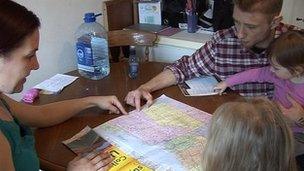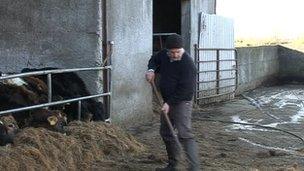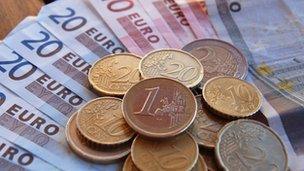Personal reflections on Ireland's exit from the bailout
- Published

The Gorman family are preparing to leave Ireland and move to British Columbia in Canada
On Sunday, Ireland will exit its three-year EU-IMF bailout programme.
BBC Northern Ireland's Dublin correspondent Shane Harrison has been hearing what it will mean for some people in the Republic of Ireland.
It is a grey Sunday morning in a playground in Maynooth, County Kildare, about 45 minutes' drive from the centre of Dublin.
Richie and Amanda Gorman are taking some time out with their daughters, Caitlin and Amanda, both aged under five.
As a family, they know all about the swings and roundabouts of bailout Ireland.
During the Celtic Tiger bubble years - even with eating out all the time - they had around 1,200 euros to spare at the end of each month.
Now with children, and with Mandy an unemployed office administrator, they struggle to pay their rent and bills.
"Who ever shouts loudest gets paid," said Richie Gorman.
"There has been a lot of times over the last three years that I've had to miss a meal, Mandy has had to miss a meal so there's food for the kids the next day. That's a wake-up call and regularly we had to do that."
The couple, who are in their 30s, have had enough of Ireland.
Richie, an electrician for the last 15 years, has got a job in Fort St John in British Columbia in Canada.
And next month the family are moving there, with Mandy hoping to get an IT qualification.
She said: "I'm not looking for a lot. Just to be able to have fun and relax and not to have to think every second about money.
"How much is in my wallet? How much is in the bank? Just to stop the stress is all I'm looking for."

Seamus Sherlock at work on his 50-acre farm in County Kerry
Three hours drive away and strong winds are catching the roof of Seamus Sherlock's shed as the separated father-of-five feeds his cows.
Unlike Richie and Mandy, he has got what he is looking for - a deal with his bank which he owes between 200,000 and 300,000 euros.
Stand-off
Last year when I visited his 50-acre farm, his friends and neighbours had barricades around his property to prevent his bank taking over the farm and his family home, which has no central heating.
But now, after almost a year-long stand-off, the two sides have reached an agreement.
The barricades around his property have now been removed.
"From day one we always wanted to pay our way," he said.
"We do not expect, nor should anyone expect, something for nothing. We borrowed and we wanted to pay it back. We just needed finances to be re-arranged because we had lost our income.
"All I want to do is give people hope that that they can stay on their farms, or in their homes, if they make an effort to pay their way."
Paying one's way has been the story of the Republic for the last three bailout years, both for individuals, and the bankrupt state.
On Sunday, the bailout officially ends.
But for Mandy and Richie Gorman, who are voting with their feet and emigrating, they expect nothing will change.
"The government now are pleasing Europe and the bond-holders, they're pleasing the banks, but they're destroying the people like us who can save the country," Mr Gorman said.
"We're being pushed out of this country just for the banks and just for Europe. It's definitely not right."
His wife, Mandy, agreed: "I don't think it will mean any difference for us. Things are just getting harder and I don't see how that's going to change. It's not going to happen."
Optimism
Back in County Limerick, near the border with Kerry, Seamus Sherlock, like the Gormans, worries about the effects of the recession on issues like the growing rate of suicide.

It could be 2042 before Ireland has fully paid off its bailout debts
And while he is cynical about the EU-IMF bailout ending on Sunday he is slightly more optimistic about the long-term.
"It's a nice news story. It's a good spin story for the government," he said.
"But we all know, in reality, we will not have our sovereignty back on December 15th.
"It will be years down the road. But if we all work together, we can get it back in time and we can put this country back on the map."
It is to other places on the map that families like the Gormans are and have been emigrating during the recession.
They, like others, do not know when, or if, they will return home permanently.
It is another price paid, the human cost, of an economic failure.
- Published7 November 2013
- Published28 October 2013
- Published15 October 2013
- Published27 June 2013
- Published10 April 2013